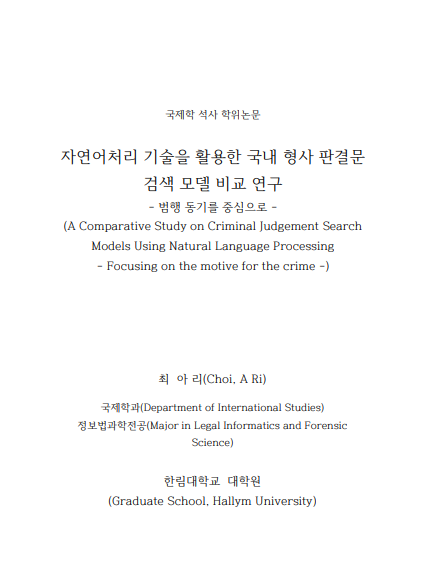Ari-Choi, from the Department of International Studies, Major in Legal Informatics and Forensic Science (LIFS), at Hallym University Graduate School has published her Master’s thesis, “A Comparative Study on Criminal Judgement Search Models Using Natural Language Processing -Focusing on the motive for the crime-“.
This paper addresses the need for efficient data processing in the legal tech field, specifically focusing on the search for similar cases based on judgments. The study utilizes Natural Language Processing (NLP) technology to analyze text judgment data and develop a similar case search model.
Various embedding models and similarity measurement methods were employed, but inconsistencies were observed in the derived similar events. Human intervention was then introduced for evaluation and ranking, revealing a lack of consensus among evaluators for many reference cases.
Statistical analysis highlighted the importance of considering the “motivation” behind a crime when screening similar cases. To address this, judgments were classified based on described motives, resulting in a dataset with corresponding keywords and sentences. Machine learning models, including Decision Tree, Random Forest, SVM, KoBERT, and KLUE/bert, were trained on this dataset. The Random Forest model performed well with a keyword-based dataset, while the KLUE/bert model excelled with a sentence-based dataset.
This study contributes to enhancing the search for similar cases and provides insights into the role of motivation in criminal judgments. Through the utilization of advanced Natural Language Processing (NLP) techniques, valuable insights are gained, enabling more accurate and effective identification of relevant cases. By emphasizing the significance of motivation, this research offers a fresh perspective on understanding and analyzing criminal judgments, ultimately contributing to the advancement of legal research and decision-making processes.
The study presents potential avenues for future research based on the experimental findings. The results demonstrate that motive, crime tools, and the relationship between the defendant and the victim are crucial factors for determining similar cases. To address these factors, it is recommended to develop a comprehensive similar case retrieval model that incorporates them. Moreover, the study highlights the significance of considering a diverse range of crime types, going beyond simple murder cases, to ensure the relevance and applicability of the derived similar cases.
Moving beyond simplistic word embeddings, this paper focuses on the distinctive characteristics of judicial decisions to enhance the accuracy and effectiveness of the similar case retrieval process. By considering the specific features of court judgments, researchers have the opportunity to advance the field of similar case retrieval in the legal domain.




